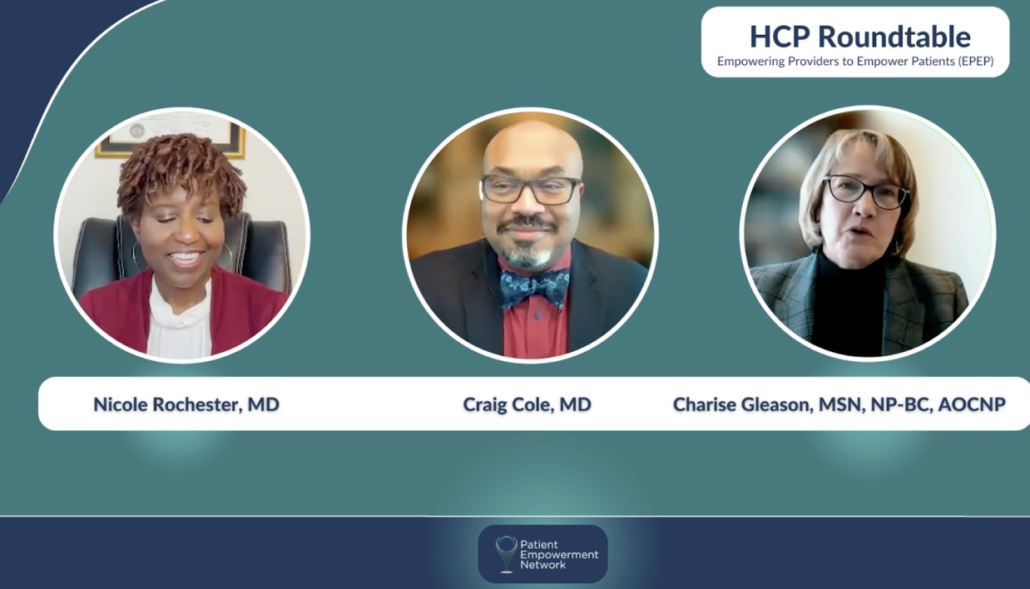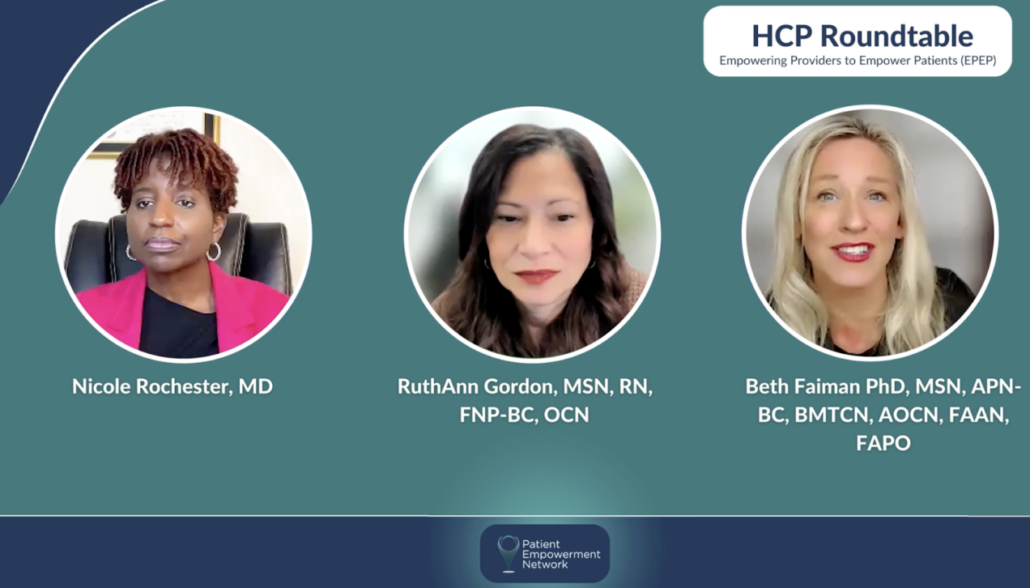Empowering Multiple Myeloma Providers to Empower Their Patients
Empowering patients is at the heart of efforts at Patient Empowerment Network (PEN), and work toward reducing health disparities is part of conversations among healthcare professionals. With this in mind, PEN has taken on a new initiative for multiple myeloma, the Empowering Providers to Empower Patients (EPEP) initiative. The program expands PEN’s reach to healthcare professionals with the goal to improve physician-patient communication; shared decision-making; and the role that myeloma patients, survivors, care partners, and healthcare professionals each play in the shared decision-making process.
The EPEP initiative includes the following resources:
- EPEP Roundtables with Dr. Nicole Rochester and myeloma experts Dr. Beth Faiman, Dr. Craig Cole, RuthAnn Gordon and Charise Gleason discuss a range of topics including how to help your myeloma patients play an active role in managing their care, healthcare provider recommended strategies for managing disease burden, the importance of advanced practice clinicians on the myeloma health care team, and ins and outs of clinical trials and communication about clinical trials.
- EPEP Resources provides the resource guide, infographics, blog, peer insight videos, and other resources to improve patient care.
- EPEP Portal utilizes PEN’s robust resource library and that of numerous trusted advocacy partners to create a vetted list of patient education resources to share with your patients. PEN delivers a curated PDF according to the patient’s interests and delivers it efficiently to their inbox.
Key Takeaways from Myeloma Experts
PEN had the opportunity to interview experts Dr. Beth Faiman, RuthAnn Gordon, Charise Gleason, and Dr. Craig Cole to learn about some of their expertise. They shared their views about essential ways that they work with patients to help empower them and to inform them about research and clinical trials.
The number of myeloma treatment options has expanded tremendously over the past few decades, and nurses play a key role in helping patients. Expert Dr. Beth Faiman from Taussig Cancer Institute shared her perspective about how patient care has changed. “…the difference from before when we had very few available therapies to now we have an armamentarium of drugs, and so deciding whether or not to participate in a clinical trial is super important.
And how can we support our patients who are now living a longer life span with all these cumulative physical and financial issues? How can the nurses support the patients to get the access to the drugs and access to the financial resources they need so that they continue living a good quality of life?…I think nurses can fill that critical gap of finding resources for patients to allow them to participate in clinical trials to live a better life.”
The expansion of treatment options has also generated some more complex clinical trials. Expert research nurse RuthAnn Gordon from Memorial Sloan Kettering Cancer Center explained the role of research nurses in these more involved trials. “…we’re guiding them, we’re educating them, we’re ensuring that they do understand the potential side effects, but do understand also what their role is in the clinical trial and what they can expect. And I think that in terms of what has changed is that we have really put more value on the fact that having that nurse that has the expertise in the clinical trial and really can gatekeep all of the patient care coordination that that involves from a clinician experience and from a clinician perspective, has really helped to ensure that our patients are ready, that we can do our very complex trials.”

Solutions for Reducing Myeloma Disparities
Another essential factor in clinical trial participation is educating patients about trials. Black myeloma patients comprise 20 percent of myeloma patients but only 4 percent of myeloma clinical trial participants. Expert Dr. Craig Cole from Karmanos Cancer Institute shared his perspective about how informing all healthcare members can create a more inviting atmosphere around clinical trials. “We make sure that the treatment nurses, the MAs, the intake people know what we’re doing, know about our clinical trials, because that’s the fun part about what we do.
The fun part is when we say, look, my goodness, this four-drug therapy had a 100 percent response rate. That shouldn’t be left in the physician compartment. It really shouldn’t be left in the provider compartment. That excitement should be clinic-wide. And when you have that all-in approach where everybody’s involved, everyone’s excited about clinical trials, it produces a culture of clinical trials that everybody wants to be part of, and the patients then can jump on that bus and feel comfortable participating in the trial.”
Involving the entire myeloma team is truly key in expanding patient care. Expert research nurse Charise Gleason from Winship Cancer Institute explained the success they’ve seen with their team members and in their clinical trial participation rate. “The myeloma team, we have APPs who are off that day who call in for this meeting, because we go over our patients, we talk about what’s, clinical trials are available, that’s just how we practice and we think about that. The myeloma team, we have APPs who are off that day who call in for this meeting, because we go over our patients, we talk about what’s, clinical trials are available, that’s just how we practice and we think about that.
In Atlanta, in our database, 40 percent of our data is based on Black patients. And we enroll about 32 percent to 33 percent of Black patients on clinical trials. And what our work on trials has showed us too, if you give the same access to every patient, you have good outcomes and good outcomes for Black patients, if not better, than white patients. So we all need to be versed on that, whether you’re the research nurse, the clinic nurse, the physician, the advanced practice. And so we really do bring that approach to taking care of our patients.”
Even though myeloma treatments have shown increases in the number and complexity of treatment options, vital HCP best practices can help further expansion and in empowering myeloma patients. How do we improve care of patients? And how do we work to remove barriers to clinical trial participation? We hope healthcare providers can take advantage of these timely resources of the EPEP myeloma initiative to work toward equitable and inclusive care for all myeloma patients.




